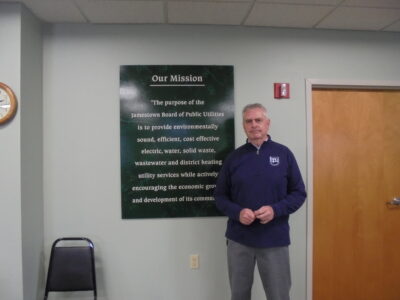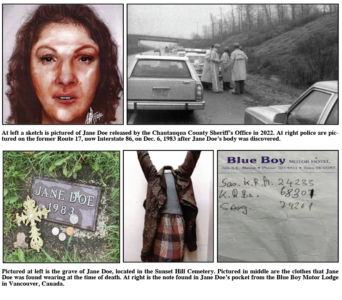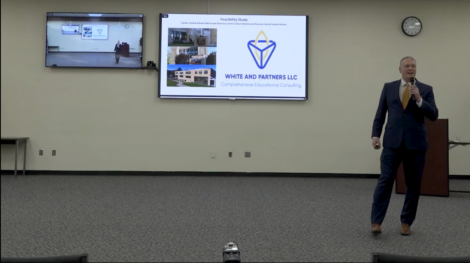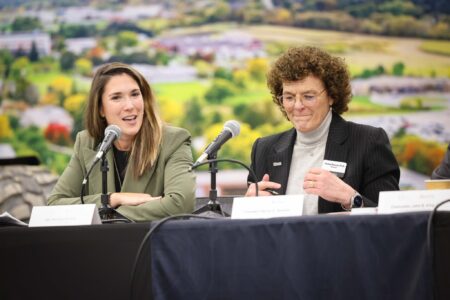Rocket Man
Cassadaga Valley Alumni’s Team Looks To Future After Third Consecutive Competition Win
- A picture of the team rocket named Genesis under the canopy at the end of the first flight. Photo courtesy of Jason Sheard
- The Bethel University team at the check-in table after the first flight of the competition. Pictured are Gary Stroick (Competition Judge), Josiah Baker, Watson Sheard, Nathan Engman, Alec Braun, and Ben Teigland. Photo courtesy of Jason Sheard
- The team’s rocket during its first flight on competition day. Photo courtesy of Jason Sheard
- Pictured is Art Gibbens and the rocket he completed his Level Two Certification with last year named The Pendragon. Photo courtesy of Art Gibbens
- Members of Bethel University’s team give their oral presentations the afternoon before flight day. Pictured are Ben Teigland, Hannah Larson, Nathan Engman, Alec Braun, and Chris Paffel. Photo courtesy of Keith Stein
- The Bethel University team on competition day. From left to right: Connor Bertram, Carter Sheard, Dr. Keith Stein (Faculty Advisor), Barak Woyke, Hannah Larson, Ben Teigland, Watson Sheard, team rocket, Nathan Engman, Art Gibbens (Mentor), Josiah Baker, Chris Paffel, Alec Braun, and Kyle Melby. Photo courtesy of Jason Sheard

A picture of the team rocket named Genesis under the canopy at the end of the first flight. Photo courtesy of Jason Sheard
Rocketry has been something that interested Art Gibbens since his time at Cassadaga Valley Central School, and that interest is paying off in big ways as he recently helped lead the Bethel University Rocket Team to their third consecutive win of the Midwest High Power Rocketry Competition.
Gibbens graduated from Cassadaga Valley in 1976, and graduated from Bethel University in 1982, where he is now a team mentor for their Rocket Team.
“In 1972, when I was in the eighth grade at Cassadaga Valley Middle School, I was in Mr. Fortuna’s English class where one of the requirements was to do a public speech on something we liked doing,” Gibbens said.
“So I did my presentation on building model cars. I had a cardboard drag strip and everything for them to be displayed on. Just a short while later a classmate, Keith Johnson, gave his speech on model rockets. I never built another model car from that day to this. After the class I asked Keith a bunch more questions and he ended up giving me an Estes Model Rocketry catalog from which I ordered my first rockets.”
Gibbens’s interest grew after that, going to fly rockets year round all around Charlotte Center and in Sinclairville. While like many young rocketeers he lost more than he recovered from flights, Gibbens continued his work and interest to this day.

The Bethel University team at the check-in table after the first flight of the competition. Pictured are Gary Stroick (Competition Judge), Josiah Baker, Watson Sheard, Nathan Engman, Alec Braun, and Ben Teigland. Photo courtesy of Jason Sheard
“Part of my interest at that time was that they did something,” Gibbens said. “A lot of activities in life you can do stuff and not see the results immediately, whereas with rockets you can see the results often in just a few days.”
Gibbens added that he has always loved working with his hands, and that rocketry gives him the ability to do that. More of his experience with rockets includes one of his dates with his wife when they were in college was to go launch rockets in a public park in Minneapolis, and working at Camp Courage, which is a camp for the physically disabled, where in the summer he helped campers build and launch rockets. He took a short break for about ten years after school until his children were old enough to build rockets of their own.
“At about this same time a bunch of us that liked to fly rockets would get together and fly,” Gibbens said. “Shortly thereafter The National Association of Rocketry Section 576 Minnesota Amateur Spacemodeler Association was formed. I joined in 1998, shortly after it was formed. I have served as Editor of the MASA Planet, the club’s monthly newsletter, as Vice-President, and as President during my tenure with the club. Along the way I was able to earn my Level One and Level Two High Power Certifications. I am hoping to attain my Level Three Certification in this coming year.”
Gibbens has also mentored teams of high school students through the American Rocketry Challenge, which began in 2002 and is the world’s largest rocketry contest for sixth through 12th graders. He mentored teams for 17 years, seeing five of his teams make it to the finals, which is the top 100 teams of the competition, and one of those teams placed fourth.
Gibbens has been the mentor of Bethel University’s rocket team for the last three years. All three of those years the team has won the Midwest High Power Rocketry Competition, which required them to do three large reports due throughout the year, an educational outreach, then an oral report, then flight day, and then a final report due after that.

The team’s rocket during its first flight on competition day. Photo courtesy of Jason Sheard
“While President of MASA I saw an article about some BU students doing something with rockets,” Gibbens said. “Then the Covid-19 pandemic hit, effectively stopping a lot of things during that time. As the time was growing to a close for my presidency at MASA, I reached out to Dr. Keith Stein, as his name was attached to a different article about a science fair that was going to be on campus. When he and I finally got together during the summer I shared with him my background in model and high-power rocketry and offered to help out in any way I could. He was very happy to have someone with my experience helping to get a team going.”
Gibbens said before he and Stein created the team the school had not had one before, but there were a few interested students. The first year the team was made up of three students that had no experience with rocketry, something that Gibbens said is not uncommon these days, and most of the time was spent learning how to build what was needed. When they got to the competition they were able to get their rockets into the air, and Gibbens said they had no idea they had done so well until it was announced that they had won.
In the second year the team expanded to seven students, and they won again, which Gibbens credited to the paperwork requirements for the competition, and last year he said they were up against a military academy team from Egypt, who were penalized after launching outside of the time limit because of something breaking, which led to Bethel University winning for the third year in a row, with their team of 16 students.
As the team’s mentor, Gibbens is the expert that teaches the students how to build their rockets in the correct way. He referred to this last year as a transition year as the three original students on the team are now seniors, having gotten through the required classes, earning higher level certifications, and for this year’s competition building their computer with the sensors that monitor how high the rocket goes and its position, on their own.
“It has always been in the forefront of my mind as I work with these students to help them to understand the basic concepts of rocketry and to encourage them to try new things to gain some experience putting things together,” Gibbens said. “This year my role as mentor was a bit less hands-on and more to give gentle nudges to keep the team moving in the right direction. In some ways the students have excelled past my experience, especially in the electrical engineering and computer coding aspects.”

Pictured is Art Gibbens and the rocket he completed his Level Two Certification with last year named The Pendragon. Photo courtesy of Art Gibbens
Gibbens said coding has never been something he learned, his previous work including building computers, and he credited the students’ coding abilities for the win this year. Looking forward to next year, Gibbens said the team is hoping to expand into more national competitions, specifically the Spaceport America Cup, which will let them compete with other collegiate teams around the world. After their success with the Midwest High Power Rocketry Competition, Gibbens said the team is up for a new challenge, but that they do not currently have the wherewithal to ensure they can get there. Part of looking to the future is the hope that the team is able to use personal and professional connections to gather funds and support so they can go.
As a Bethel University alumni himself, who originally went to the school for football, Gibbens said he wanted to share that this is just one fun thing students that are a part of the physics program at the university can do.
“It’s been a really fun ride,” Gibbens said. “I’m excited to see what the future holds for Bethel University’s Rocketry Team. Without sounding too much like a pun, the only place we can go is up. I think we’ve launched well and far exceeded Dr Stein’s expectations.”
For more information on the physics and engineering department at Bethel University, Stein, who is a physics professor, can be contacted at (651)638-6173 or k-stein@bethel.edu.

Members of Bethel University’s team give their oral presentations the afternoon before flight day. Pictured are Ben Teigland, Hannah Larson, Nathan Engman, Alec Braun, and Chris Paffel. Photo courtesy of Keith Stein

The Bethel University team on competition day. From left to right: Connor Bertram, Carter Sheard, Dr. Keith Stein (Faculty Advisor), Barak Woyke, Hannah Larson, Ben Teigland, Watson Sheard, team rocket, Nathan Engman, Art Gibbens (Mentor), Josiah Baker, Chris Paffel, Alec Braun, and Kyle Melby. Photo courtesy of Jason Sheard












